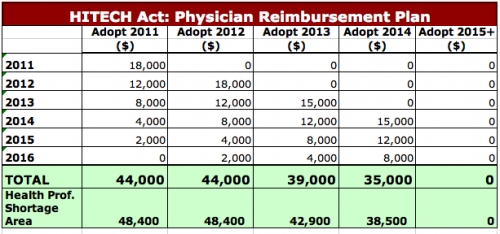The stimulus bill has obviously generated a significant amount of buzz in the healthcare industry. No one, however, has asked what the stimulus bill means for mHealth--that is until we asked that very question of analyst John Moore from Chilmark Research. Moore and the rest of the team at Chilmark have been penning reports and consulting companies on EHRs and related health IT technologies for the last couple years. Moore has also been one of the most ardent analysts working to unravel the intricacies of the stimulus bill and its imminent effect on the industry. If you haven't yet, check out Chilmark's blog for more details on the stimulus bill and related incentives for physicians who demonstrate "meaningful use" of EHRs in the next couple years as well as the penalties in store for physicians who fail to adopt EHRs by 2015. Read on for Moore's take on whether mHealth will get any of that sweet, sweet stimulus money and also how mobiles could be the key to making EHR implementation actually work...

mobihealthnews: Do you think there is going to be a trickle down of stimulus money to these last mile mobile companies that, for example allow doctors to use PDAs or tablets to update EHRs/EMRs, or do you think companies that make those kinds of predictions are being ridiculous? [Ed. note: How's that for a leading question?]
Moore: It's kind of ridiculous. I don't see that happening. Right now [the stimulus] is very focused on getting physicians to adopt and use, in a meaningful fashion, EHRs. That's all they are looking at right now in the HITECH act. They are giving ONC discretionary money, but $300M has been earmarked for health information exchanges--that has nothing to do with mobile--that's all about getting clinical data liquid. Within the meaningful use of the EHRs, one of the criteria they are certainly looking at is electronic prescriptions (e-prescriptions) and another criteria is care coordination and using an EHR in such a way that it's sharing records and clinical notes, which has nothing to do with mobile. Sure, mobile can say it is at the point-of-care and it can be at the point-of-care with a mobile solution but it's not the software itself, it's the modality by which it's delivered. They can sing that song and make that case, but I don't think they are going to get funding. They can try, of course, but I doubt anyone thinks a physician is going to get reimbursed just because they picked up a BlackBerry. The physician is going to get reimbursed if he shows meaningful use of an EHR and I'm not sure how mobile solutions will be able to message to that and help a physician capitalize on that reimbursement schedule.
mobihealthnews: That said, putting electronic records into hospitals and doctors offices really does put the industry into a better position to take advantage of the mHealth solutions out there, right? Whether it has anything to do with the stimulus money directly, that money will really prime the industry for mHealth solutions. Agree?
Moore: Well, the biggest problem with EHRs--and this is probably where mobile can come into play here--the biggest problem with EHRs is that they often times suck. They are difficult to deal with: Physicians usually have to constantly sign-in and sign-out of these things nearly 100 times a day because of security requirements. They have to step through five or seven screens just to write a prescription for their patients! Compare that to just whipping out the little script sheet and scribbling down a prescription and giving it to them.
mobihealthnews: So where does mobile come in?
Moore: EHRs are often difficult to use. They are difficult for physicians to use when they are sitting in front of a computer, but physicians often aren't sitting in front of a computer. Physicians are moving around the hospital or around their practice. They are not sitting in front of a computer--they are meeting with their patients. So, a big knock against EHRs is that they do not fit the workflow that physicians have in place. Part of that workflow is being very mobile, being on-the-run, being on-the-go. Therefore, to make EHRs work, to make the adoption model work for EHRs and finally deliver real value to physicians, the key is paying very, very close attention to that workflow. Make sure those solutions are easy to use, easy to operate and fitting within physicians' workflow. Therefore, mobile may have a play there, because it can help facilitate EHRs into a physician's workflow.
SUBSCRIBE TO OUR FREE, WEEKLY NEWSLETTER FOR MOBIHEALTHNEWS BY EMAIL
















